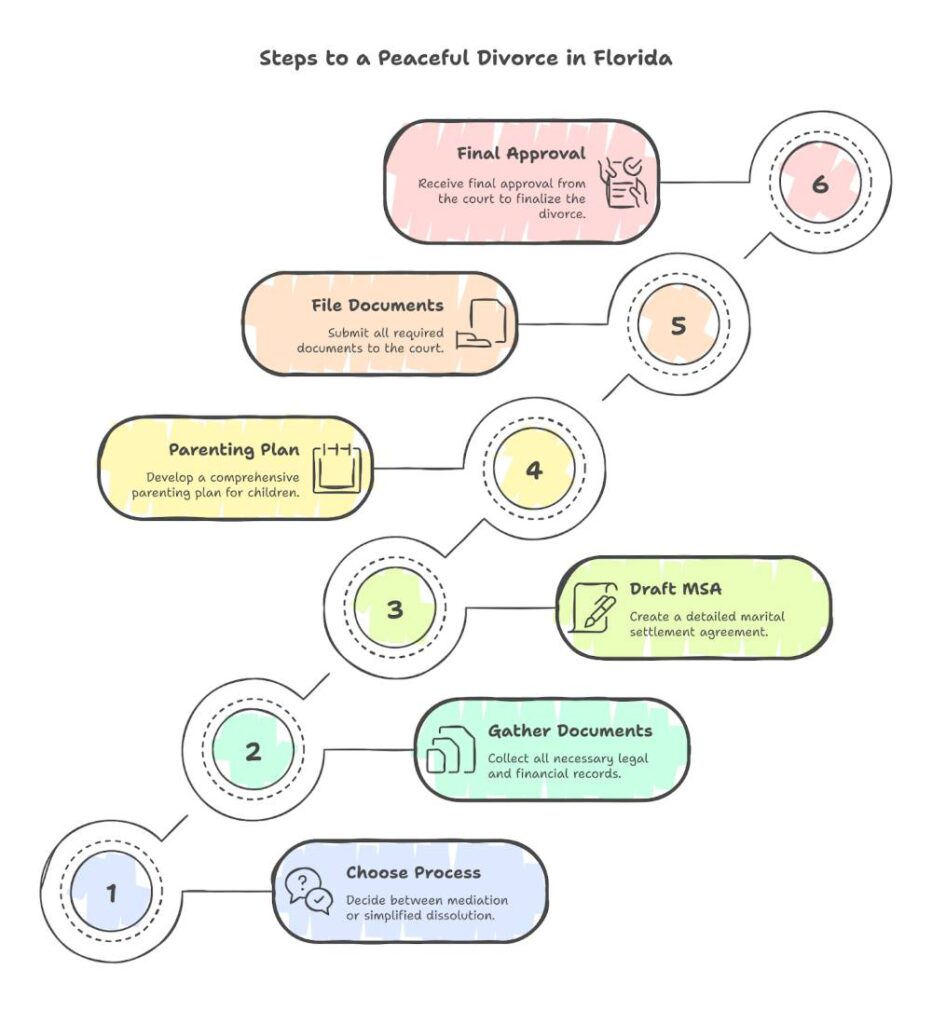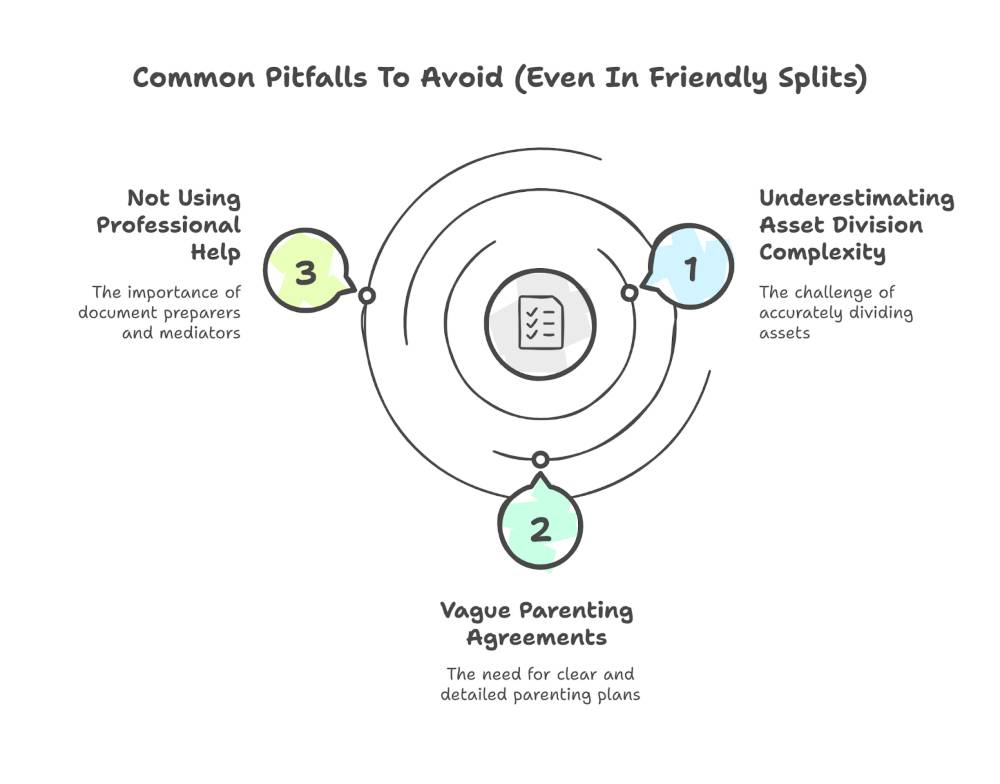
No-Drama Divorce: The Ultimate Step-by-Step Guide for Florida Couples Seeking a Peaceful Separation

Divorce doesn’t have to mean endless fights or court battles. In Florida, couples who want a smoother process can work together on important decisions and move forward with less stress.
A no-drama divorce in Florida lets people collaborate on property, finances, and kids, without turning everything into a war.
These days, many couples choose an uncontested approach, in which both sides agree on the main issues.
Understanding how Florida’s divorce process works and using tools like mediation can save time, money, and emotional energy.
Staying informed helps people avoid common mistakes and feel more in control of what comes next.
Key Takeaways
- No-drama divorce in Florida is possible and reduces stress.
- Mediation and clear communication help couples avoid court battles.
- Knowing the steps makes the divorce process easier to follow.
Should You Divorce Without A Fight?

Many couples in Florida hope to end things peacefully and civilly. A no-drama divorce can be less stressful, faster, and easier on the wallet, but unfortunately, not always realistic for everyone.
Signs You And Your Spouse Might Be Ready For A Peaceful Split
A peaceful divorce in Florida starts with open, honest communication and some basic mutual agreements. Both people need to talk without anger or defensiveness taking over.
Trust matters—even when the marriage ends, you must both feel safe enough to share information and discuss the big stuff.
Some signs a peaceful split could work:
- Agreement on dividing property and debts
- A shared plan for parenting and child custody
- Respect for each other’s needs and wishes
- No ongoing abuse or manipulation
- Both people want the divorce and are ready to cooperate
Suppose Theess is usually simpler and less expensive. If you check most of these boxes, the uncontested divorce process in Florida can help you avoid fighting over the small stuff.
When A No-Drama Divorce Isn’t Advisable
Sometimes, a peaceful divorce just isn’t in the cards. If there’s a history of abuse, lots of anger, or one person is hiding things, a calm process probably isn’t safe or fair.
If either person tries to hide money or assets or isn’t honest, it’s time to seek legal help.
Watch out for situations like:
- Domestic violence or threats
- One spouse controlling money or withholding information
- Major fights about custody or support
- Pressure or fear that blocks honest choices
In these cases, a lawyer is necessary. Forcing a peaceful solution can lead to unfair deals or lost rights. Professionals can help protect those at risk and guide you to a safer outcome.
Cost Comparison
The cost of divorce in Florida depends on how much you fight and what legal help you need. Peaceful, uncontested divorces are almost always cheaper than court battles.
Most people pay basic court fees, some paperwork costs, and maybe a mediation fee.
| Divorce Type | Typical Cost Range | Timeline |
| Uncontested (no-drama) | $500–$1,500 | 1–3 months |
| Contested (with fighting) | $5,000–$20,000+ | Several months to years |
A peaceful divorce can cut costs and property disputes by skipping extra hearings. Some couples even go through several steps without lawyers. Difficult cases, though, usually mean higher bills and longer waits.
Considering divorce without court battles or sky-high legal fees? Peacemaker Mediation Group offers Florida couples a smoother path with divorce mediation. Schedule your peaceful first step with us today.
If you’re ready to get started, call us now!
Florida’s Legal Framework For Amicable Divorce
Florida offers couples several good options for a peaceful split. The laws here aim to make divorce as simple and stress-free as possible, especially for people willing to work together.
Florida As A No-Fault Divorce State
Florida uses a “no-fault” divorce system. You don’t have to prove your spouse did something wrong.
The only thing you need is to say the marriage is “irretrievably broken,” or, in rare cases, that one spouse is mentally incapacitated.
This system helps people skip the blame game and avoid long court fights. It’s just easier for those who want to separate calmly and quickly.
Florida is a great place for anyone looking for an easy divorce since you don’t have to show fault.
With a no-fault approach, both parties can keep things private and focus on what’s next. Most folks go this route because it’s less stressful, especially when kids are involved.
Eligibility For Simplified Dissolution Of Marriage
Florida’s simplified divorce process lets some couples separate quickly with barely any paperwork.
People call it a “Simplified Dissolution of Marriage.” It’s perfect for partners who want a fast, low-conflict divorce.
To qualify for a simplified divorce, here’s what you need:
- Both agree that the marriage is beyond repair.
- No kids under 18 together.
- Neither spouse is pregnant.
- Agreement on splitting property and debts.
- At least one spouse has lived in Florida for six months or more.
- Both agree to give up the right to alimony and appeal.
You can complete simple forms and head to the courthouse together if you meet these rules. Many finish in about 30 days, so it’s a real option for an easy divorce in Florida.
Mediation Requirements In Florida Family Courts
Florida courts usually require mediation before scheduling a divorce trial if you don’t use the simplified route.
Mediation means meeting with a neutral third party—a mediator—who helps both sides resolve issues like child custody, support, or property division. It keeps fights out of court and helps people find common ground. Mediation is confidential, and the mediator doesn’t make decisions—they just guide the conversation.
If you reach an agreement, you’ll write it down and hand it to the judge. Judges like mediation because it saves time, money, and emotional wear and tear. This step is a big part of Florida’s focus on amicable divorce and lets couples keep control of their outcome.
Step-By-Step Guide To A Peaceful Divorce In Florida

Getting a low-conflict divorce in Florida is possible with a little planning and honest communication.
Picking the right process, organizing paperwork, and agreeing on finances and kids all help make things smoother.
Step 1 – Decide To Mediate Or File Simplified
Most couples who want a no-drama divorce start by choosing between mediation and Florida’s simplified dissolution process. Mediation means meeting a neutral third party who helps you make decisions together, keeping the power in your hands, not a judge’s.
Simplified dissolution is for couples who agree on everything, have no kids under 18, no one’s pregnant, and no one wants alimony.
It’s quick and way less stressful. This is the easiest path if you are already on the same page and have your paperwork ready. This approach speeds up an uncontested divorce in Florida and saves you money.
Step 2 – Gather All Legal & Financial Documentation
Accurate paperwork makes a peaceful divorce possible. Each person should collect recent account statements, pay stubs, tax returns, mortgage or rent info, retirement account balances, car titles, credit card statements, and insurance documents.
Organizing these records helps prevent confusion and speeds up the process. It also allows both people to see what’s owned and owed.
Making a checklist can keep things straight. Courts will want a full list of assets and debts before they approve any agreement. Clear records keep things fair and cut down on misunderstandings.
Step 3 – Draft The Marital Settlement Agreement (MSA)
The marital settlement agreement (MSA) is where you both spell out how to split assets, debts, and any support payments. In Florida, a detailed MSA can save you time in court and prevent future arguments.
A Florida marital settlement agreement template helps make sure you cover everything.
The MSA should list who gets each bank account, car, and piece of property, and how debts are paid or transferred. If there’s alimony, write down the amount and payment schedule.
Both parties must sign the MSA and file it with the court. It’s smart to ask a lawyer to look it over if anything is confusing. This step keeps things fair and supports a calm process.
Step 4 – Parenting Plans & Time Sharing In Florida
Parents must create a Florida divorce parenting plan for all children under 18. This written plan lays out where the children will live, how the parents will handle daily life, and how special days will be divided.
A solid parenting plan includes a detailed schedule, instructions for making decisions about school or healthcare, communication rules, and strategies for handling conflicts.
Courts prefer it when parents agree on these topics—it’s less stressful for the kids. The plan should also mention how to adjust time-sharing if problems arise. Both parents should sign the plan before submitting it to the court.
Step 5 – File Your Documents With The Florida Courts
You must file all the important documents with the right Florida court to start the legal process.
This includes the petition for dissolution, the marital settlement agreement, the parenting plan, and your financial affidavits.
Florida allows e-filing, which makes submitting paperwork a lot faster and less of a hassle. If unsure, a Florida divorce e-filing guide can walk you through it.
Fill out every section completely. Keep copies of everything you submit, just in case.
Your divorce could be delayed if the court finds mistakes or missing information. Double-check all details since the clerk can’t give legal advice.
Step 6 – Final Hearing Or Administrative Approval
In uncontested cases, couples sometimes skip going to court. A judge might review your documents and approve them without a hearing.
Other times, you’ll get a quick court date to confirm your agreement in person. If you do need a hearing, it’s usually short and simple.
The judge looks over your paperwork and may ask a few basic questions. If everything checks out, the judge signs the final judgment, which legally ends the marriage.
An uncontested divorce in Florida can sometimes be completed in a month, but the timing depends on the court’s calendar and whether you filed the paperwork correctly.
Peacemaker Mediation Group helps couples reach fair parenting plans and property agreements without courtroom stress. Contact us now to begin your mediation journey.
If you’re ready to get started, call us now!
How To Use Mediation For A No-Drama Divorce
Mediation lets couples make decisions together with a lot less stress and fighting. It can save money, move things along faster, and give you a private place to talk through tough stuff like child custody or dividing assets.
What Happens In Divorce Mediation?
During divorce mediation in Florida, a trained neutral person called a mediator meets with both spouses. The mediator doesn’t take sides or make decisions for you.
Each spouse shares thoughts on child custody, parenting, support, and splitting property.
The mediator keeps the conversation on track so both people listen and try to find common ground.
Notes might be taken, and any agreements should be written down. Steps in mediation usually look like this:
- Talking about what each person needs.
- Looking at family finances and property.
- Coming up with solutions for child custody or sharing time with kids.
- Deciding on child support or other payments.
- Writing a formal agreement.
Mediation is usually quicker than court and costs less than hiring two lawyers. Although divorce mediation costs in Florida vary, it’s almost always cheaper than a drawn-out legal fight.
Why Mediation Works For Emotionally Charged Situations
Divorce is an emotional time, especially with kids in the mix. Mediation helps lower tension because it’s private and focused on working together.
There’s less pressure than in a courtroom, so parents can focus on what’s best for their kids. Family mediation services in Florida know how to handle strong feelings and keep talks respectful.
If things get heated, a good mediator helps everyone stay calm and remember their main goals, such as finding fair solutions and making life easier for their children.
When Parents who have child custody mediation in Florida make their parenting plans instead of letting a judge decide, that gives parents more control and helps shield kids from conflict.
Choosing The Right Mediator In Florida
Picking the right mediator matters. Look for someone experienced with family law who knows Florida’s rules.
Check reviews, ask about training, and see if they charge flat fees or hourly rates. Many mediators explain their process for family mediation services in Florida on their websites.
Both parties should trust and feel comfortable with the mediator. Ask if they’ve handled child custody or complex property cases. Some mediators will even meet with kids if both parents agree.
Common Pitfalls To Avoid (Even In Friendly Splits)

Even in amicable divorces, mistakes can cause lasting headaches, extra costs, or confusion about responsibilities. Taking the time to avoid these issues makes life easier for everyone.
Underestimating Asset Division Complexity
Dividing assets is rarely as simple as it looks. There’s personal property, joint bank accounts, real estate, retirement accounts, debts—you name it.
Some couples try to split things fast, but skipping details can lead to unfair results or legal messes down the road. If one person handles the money, the other might miss hidden assets, old debts, or forgotten retirement plans.
It’s crucial to document everything owned and owed. Florida law aims for fair distribution, not just a straight 50/50 split.
Mistakes here are tough to fix after the divorce is final. List property and debts carefully.
Valuing big assets, like homes or businesses, might need a pro. Skipping these steps can spark arguments even after the papers are signed, and courts rarely reopen cases unless there’s clear fraud or a major mistake.
Vague Parenting Agreements
Parenting plans need to be clear and detailed. Using phrases like “reasonable visitation” or “as agreed” leads to disagreements later on.
Spell out pick-up and drop-off times, holidays, school breaks, and travel in writing. Vague agreements confuse both parents and kids, especially when routines change.
The Florida court system expects parenting plans to address health care, schooling, and decision-making. A good agreement covers:
- Daily and weekly time-sharing schedules
- Exchange locations and times
- How changes or conflicts will be handled
Having everything in writing prevents miscommunication and cuts down on stress. According to legal experts in Florida divorce proceedings, this is a common mistake.
Not Using A Document Preparer Or Mediator For Filing
Plenty of people try to get a divorce to save time and money. But Florida divorce paperwork is tricky. If you miss a document or fill out forms wrong, you might delay the whole thing or even get your case tossed.
A document preparer for divorce in Florida helps ensure everything is correct and complete. They know the forms, deadlines, and local court rules.
This kind of divorce paperwork in Florida is especially helpful for couples who mostly agree but don’t want to risk mistakes.
A mediator can also help guide the conversation and work out disagreements before you file. Using these services saves time, lowers stress, and enables you to avoid costly errors that could turn a “simple” divorce into a nightmare.
Finalizing The Divorce Without Court Drama
If you’re prepared and willing to work together, you can finish a simple divorce in Florida with less stress. Handling the final steps calmly keeps things moving and helps both people start fresh.
What The Final Hearing Looks Like
Once you’ve settled everything, the case goes to a final hearing. In most uncontested divorces, this hearing is quick and to the point.
One or both spouses might show up. The judge reviews your paperwork and checks that both people agree. If everything’s in order, the judge grants the divorce.
There’s usually no long trial or arguments. The focus is just on making sure you’ve met all legal requirements.
Couples who follow the uncontested process often spend just a few minutes before the judge, keeping things calm and private.
Some Florida counties allow remote or online final hearings for uncontested divorces. This can save time and help you avoid the courthouse entirely.
After The Divorce Is Final: Updating Records
After the judge signs the final judgment, both spouses should update their records immediately. That means changing driver’s licenses, Social Security numbers, and bank accounts.
Banks or government offices sometimes need a certified copy of your divorce order to make changes. Remember to update beneficiary information on insurance and retirement accounts, too.
It’s smart to update emergency contacts at work and with your doctor. A checklist helps make sure nothing slips through the cracks.
Divorce records are public, but most other updates stay private. Local offices can give step-by-step instructions for updating legal documents.
Emotional And Financial Benefits Of The No-Drama Path
Choosing a low-conflict divorce in Florida can save money and lower stress for families. Keeping things peaceful also helps kids adjust and lets everyone start healing sooner.
Cost-Savings Over Traditional Divorce
A no-drama divorce in Florida usually costs much less than a contested one. Couples who agree on big points like property and parenting avoid expensive court fights and repeat filings.
Attorney fees are lower for low-conflict or uncontested divorces. Mediation helps, too, since it encourages agreement without dragging things out.
Some people even use online forms or local court help centers to handle filings, making a low-cost divorce in Florida possible.
There are fewer hidden expenses. Less arguing means fewer meetings and less time in court, which keeps things simple and affordable.
Less Emotional Damage For Children
Fighting in court can hurt kids. A peaceful divorce usually involves better communication and collaboration between parents, which gives kids more stability.
Kids see their parents cooperating. This can lower anxiety and sadness and prevent them from feeling like they have to pick sides. A respectful split also shows kids a healthy way to solve problems.
Avoiding conflict means kids’ daily lives are less disrupted and there is less risk of stress, acting out, or trouble at school.
Quicker Recovery And Post-Divorce Peace
A no-drama divorce usually leads to faster emotional healing. When everyone stays calm and respectful, it’s easier to move on without holding onto anger or blame.
This approach encourages people to build new routines and start fresh sooner. Both sides can focus on their future instead of being stuck in old fights.
A smoother process can also reduce anxiety and depression. Parents, especially, find it easier to co-parent and give kids a stable home when the divorce ends without more drama.
Conclusion
Choosing a no-drama divorce in Florida can help couples sidestep a lot of unnecessary stress. It keeps things straightforward and, honestly, that’s a relief for everyone involved.
When families calmly discuss property, support, and parenting, they set themselves up for a healthier transition. Open communication—yeah, it’s not always easy, but it does make a difference at every turn.
Gathering paperwork and hashing out the important points early on makes everything smoother. Couples who manage this usually finish faster and spend less, which is a plus.
If you hit a wall or feel lost, seeking legal advice can be a lifesaver. Sometimes, just asking for help upfront can head off bigger headaches later.
Want a divorce that protects your peace and keeps you in control? Peacemaker Mediation Group guides Florida couples through no-drama, flat-fee divorce options. Contact us to schedule your session now.
Contact Us Today For An Appointment
Frequently Asked Questions
What is a no-drama divorce in Florida?
A no-drama divorce in Florida is a peaceful, cooperative separation process that uses mediation or simplified dissolution to minimize conflict, legal fees, and court involvement.
Can we get divorced in Florida without going to court?
Yes. Couples can avoid court by filing for a simplified dissolution or resolving all issues through mediation, often requiring only one brief court appearance or none.
How much does a no-drama divorce cost in Florida?
Depending on complexity, an arama divorce in Florida typically costs $500 to $5,000. Deposition and document preparation services are significantly cheaper than hiring litigation attorneys.
How long does a peaceful divorce take in Florida?
Most peaceful divorces in Florida are finalized in 30 to 90 days, provided both parties agree and file complete documentation with the court.
What’s the difference between mediation and simplified divorce in Florida?
Mediation helps couples reach an agreement on divorce terms, while a simplified divorce is a fast-track court filing for couples without kids or alimony and full agreement on all issues.
Do we need a lawyer for a no-drama divorce in Florida?
No, but it can help. Many couples use a mediator or legal document preparer instead of hiring separate attorneys, especially for uncontested cases.
What are the main steps in a no-drama Florida divorce?
The key steps include agreeing to terms, preparing documents, filing with the court, attending a final hearing (if required), and




